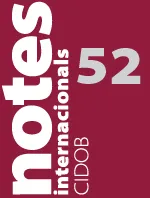Eastern partnership? More like mutual dependence. The case of EU home affairs cooperation with Moldova

Notes internacionals CIDOB, núm. 52
Signs of political progress in Moldova, much in the news in March 2012, have been heartily greeted by the EU. The bloc has invested heavily in this little neighbour, both in financial and political terms, and the investment now seems to be paying off. But there is a slight whiff of desperation in the EU’s tone, and something a little unsettling about the assessment by local analysts that Moldova’s political parties are only cooperating because of EU pressure. There’s good reason for concern. The stated goal of EU policy in the region is to build partnerships with countries like Moldova. Yet, the EU and Moldova are not strong partners able to rely upon one another; they are weak actors unwillingly reliant upon one another. The example of home affairs cooperation, a central plank of their “partnership”, highlights this state of mutual dependence. In particular the incentive and conditionality mechanisms employed by the EU to cajole Moldova into reforming its security apparatus indicate the pitfalls of their relationship.
(...)